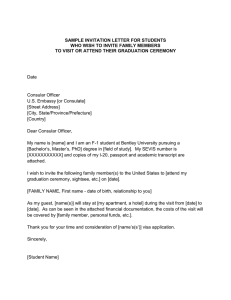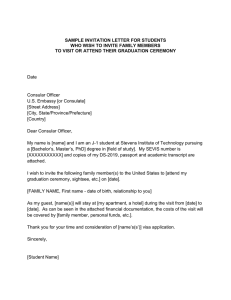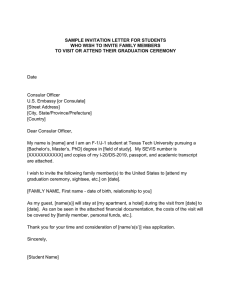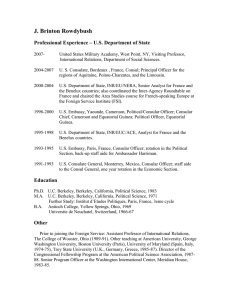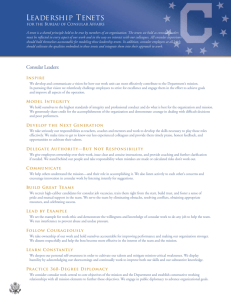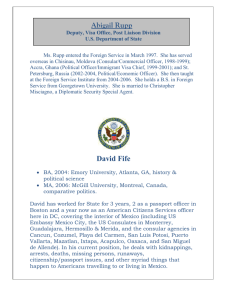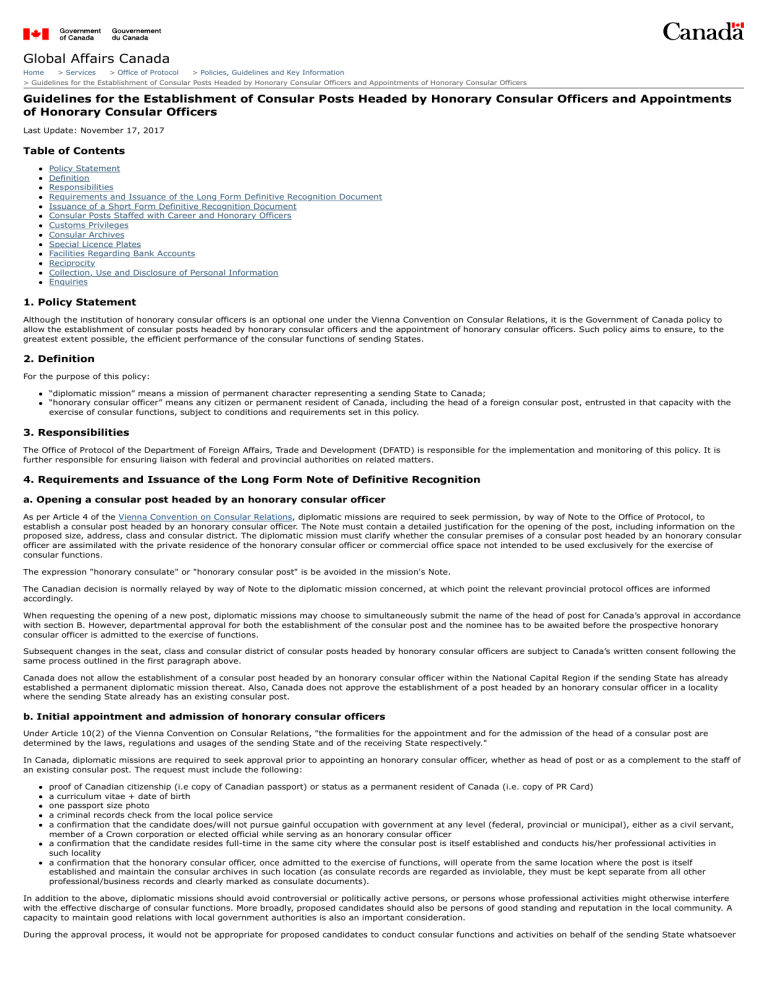
Global Affairs Canada Home > Services > Office of Protocol > Policies, Guidelines and Key Information > Guidelines for the Establishment of Consular Posts Headed by Honorary Consular Officers and Appointments of Honorary Consular Officers Guidelines for the Establishment of Consular Posts Headed by Honorary Consular Officers and Appointments of Honorary Consular Officers Last Update: November 17, 2017 Table of Contents Policy Statement Definition Responsibilities Requirements and Issuance of the Long Form Definitive Recognition Document Issuance of a Short Form Definitive Recognition Document Consular Posts Staffed with Career and Honorary Officers Customs Privileges Consular Archives Special Licence Plates Facilities Regarding Bank Accounts Reciprocity Collection, Use and Disclosure of Personal Information Enquiries 1. Policy Statement Although the institution of honorary consular officers is an optional one under the Vienna Convention on Consular Relations, it is the Government of Canada policy to allow the establishment of consular posts headed by honorary consular officers and the appointment of honorary consular officers. Such policy aims to ensure, to the greatest extent possible, the efficient performance of the consular functions of sending States. 2. Definition For the purpose of this policy: “diplomatic mission” means a mission of permanent character representing a sending State to Canada; “honorary consular officer” means any citizen or permanent resident of Canada, including the head of a foreign consular post, entrusted in that capacity with the exercise of consular functions, subject to conditions and requirements set in this policy. 3. Responsibilities The Office of Protocol of the Department of Foreign Affairs, Trade and Development (DFATD) is responsible for the implementation and monitoring of this policy. It is further responsible for ensuring liaison with federal and provincial authorities on related matters. 4. Requirements and Issuance of the Long Form Note of Definitive Recognition a. Opening a consular post headed by an honorary consular officer As per Article 4 of the Vienna Convention on Consular Relations, diplomatic missions are required to seek permission, by way of Note to the Office of Protocol, to establish a consular post headed by an honorary consular officer. The Note must contain a detailed justification for the opening of the post, including information on the proposed size, address, class and consular district. The diplomatic mission must clarify whether the consular premises of a consular post headed by an honorary consular officer are assimilated with the private residence of the honorary consular officer or commercial office space not intended to be used exclusively for the exercise of consular functions. The expression "honorary consulate" or "honorary consular post" is be avoided in the mission's Note. The Canadian decision is normally relayed by way of Note to the diplomatic mission concerned, at which point the relevant provincial protocol offices are informed accordingly. When requesting the opening of a new post, diplomatic missions may choose to simultaneously submit the name of the head of post for Canada’s approval in accordance with section B. However, departmental approval for both the establishment of the consular post and the nominee has to be awaited before the prospective honorary consular officer is admitted to the exercise of functions. Subsequent changes in the seat, class and consular district of consular posts headed by honorary consular officers are subject to Canada’s written consent following the same process outlined in the first paragraph above. Canada does not allow the establishment of a consular post headed by an honorary consular officer within the National Capital Region if the sending State has already established a permanent diplomatic mission thereat. Also, Canada does not approve the establishment of a post headed by an honorary consular officer in a locality where the sending State already has an existing consular post. b. Initial appointment and admission of honorary consular officers Under Article 10(2) of the Vienna Convention on Consular Relations, "the formalities for the appointment and for the admission of the head of a consular post are determined by the laws, regulations and usages of the sending State and of the receiving State respectively." In Canada, diplomatic missions are required to seek approval prior to appointing an honorary consular officer, whether as head of post or as a complement to the staff of an existing consular post. The request must include the following: proof of Canadian citizenship (i.e copy of Canadian passport) or status as a permanent resident of Canada (i.e. copy of PR Card) a curriculum vitae + date of birth one passport size photo a criminal records check from the local police service a confirmation that the candidate does/will not pursue gainful occupation with government at any level (federal, provincial or municipal), either as a civil servant, member of a Crown corporation or elected official while serving as an honorary consular officer a confirmation that the candidate resides full-time in the same city where the consular post is itself established and conducts his/her professional activities in such locality a confirmation that the honorary consular officer, once admitted to the exercise of functions, will operate from the same location where the post is itself established and maintain the consular archives in such location (as consulate records are regarded as inviolable, they must be kept separate from all other professional/business records and clearly marked as consulate documents). In addition to the above, diplomatic missions should avoid controversial or politically active persons, or persons whose professional activities might otherwise interfere with the effective discharge of consular functions. More broadly, proposed candidates should also be persons of good standing and reputation in the local community. A capacity to maintain good relations with local government authorities is also an important consideration. During the approval process, it would not be appropriate for proposed candidates to conduct consular functions and activities on behalf of the sending State whatsoever or to contact the Government of Canada to inquire about the status of the process. Once a country’s application is approved, a process which takes between four (4) and six (6) weeks, the Office of Protocol will issue a long form Note of Definitive Recognition (containing the embossed DFATD seal) as proof of the individual’s status in Canada and will automatically list the name of the individual in the “Diplomatic, Consular and Other Representatives in Canada” publication. Given that Canada does not issue Notes of provisional recognition, diplomatic missions that do not wish the name of the approved candidate listed in the aforesaid publication must explicitly mention this in their initial request for approval. The long form Note of Definitive Recognition will normally be valid for a period of three (3) years. c. Renewing an appointment Extensions of appointments must be requested at least four (4) weeks prior to the expiration of the Note of Definitive Recognition. In submitting requests for renewal, diplomatic missions are encouraged to take the opportunity to update the individual’s file, including any changes to the address of the consular premises, telephone and fax numbers, available Internet addresses and consular district. The request must also include the following: an updated curriculum vitae one passport size photo an updated criminal record check from the local police service (every six (6) years only) Once a country’s application for the renewal of an appointment is approved, a process which takes approximately two (2) weeks, the Office of Protocol issues a Note of Definitive Recognition (containing the embossed DFATD seal) as proof of the individual’s continued status and informs the relevant provincial protocol offices accordingly. In the event that 90 days have elapsed since the expiry of the Note of Definitive Recognition and the sending State has not yet specified its intentions in writing with regard to renewing the appointment, the Department will automatically withdraw the status of the honorary consular officer and notify the sending State accordingly. d. Promotions Diplomatic missions are required to seek permission prior to promoting an honorary consular officer by way of Note, along with an updated curriculum vitæ. Such a request may be regarded as implying a request for elevation of the consular post itself. Once approved, a process which takes approximately five (5) working days, the Office of Protocol issues a new Note of Definitive Recognition and informs the relevant provincial protocol offices accordingly. 5. Issuance of New Short Form Definitive Recognition (Exequatur) Document a. Eligibility Effective October 21, 2014, all honorary consular officers to whom the Department has issued a Note of Definitive Recognition recognizing them in a consular capacity will be eligible for a complementary Short Form Exequatur Document (SFED) of equal duration. The SFED, in the form of a photo identification, is designed to enhance facilities to honorary consular officers in the exercise of their functions, as enumerated under Article 5 of the Vienna Convention on Consular Relations, within their consular district. b. Program Deployment, Terms and Conditions Newly recognized honorary consular officers to whom the Department has issued a (long form) Note of Definitive Recognition will automatically receive the SFED via their supervisory foreign State (i.e. the supervising diplomatic mission). It is incumbent on the supervising foreign State to provide to the honorary consular officer with the “User Agreement” which outlines the terms and conditions on the use of the SFED. As for all other currently-listed honorary consular officers, the Department will progressively issue the SFED on the basis of order of precedence. It is expected that the SFED issuing process will take between six (6) and nine (9) months to finalize. The use by an honorary consular officer of the SFED is strictly voluntary. However, any use of it will need to comply with the terms and conditions as set out in the User Agreement. More specifically, as a SFED holder, the honorary consular officer agrees to the following: To recognize that the SFED belongs to the Department and that it is not transferable to other individuals, including family members To return the SFED upon demand or when the honorary consular officer is no longer recognized by Canada in a consular capacity To use the SFED in the exercise of consular functions only, understanding that the SFED must not be used as a tax/customs exemption card, or as an alternative to a (i) travel document when entering Canada or (ii) provincial driver’s licence To recognize that any use of the SFED to avoid the normal enforcement of Canadian laws, including on traffic matters, is an improper and illicit use of such document To limit its use to the consular district only It rests exclusively with each provincial/territorial/municipal government authority to determine whether the SFED can be used to access services under their authority. If an honorary consular officer violates a term or a condition of the SFED, the Department will assess whether that person’s document should be suspended (and for how long) and will inform the supervising mission accordingly. Should there be serious breaches and/or violations, the Department may inform the supervising mission of the withdrawal of the honorary consular officer’s exequatur, thus giving effect to Article 25 of the Vienna Convention on Consular Relations. c. Lost, stolen or damaged SFED Honorary consular officers, via the supervising diplomatic missions, must notify the Department once the SFED is lost, stolen or damaged. 6. Consular Posts with Mix Staff of Career and Honorary Officers The privileges and immunities of honorary consular officers are more narrowly defined than those to which career consular officers are entitled. In consideration of this, career consular officers and honorary consular officers may be authorized to exercise their functions from the same consular post if the career consular officer is head of post and thus has a higher rank than any other honorary consular officer under his or her oversight. Effective January 2013, the Department will no longer accept that an existing consular post of which the head is an honorary consular officer be incrementally staffed with career consular officers. Likewise, the Department will not accept the proposed appointment of an honorary consular officer to succeed a current head of consular post already staffed with career consular officers. The order of precedence between two or more heads of consular posts is determined according to the rank and class, and their respective dates of definitive recognition. 7. Customs Privileges Unlike career consular officers who are exempt from customs duties and taxes at all times on articles imported for official and personal use, honorary consular officers (who are Canadian citizens or permanent residents as per the above definition) are exempt from customs duties and taxes on goods for official use, i.e. coats of arms, flags, signboards, seals and stamps, books, official printed matter, office furniture, office equipment and similar articles supplied by or at the instance of the sending state to the consular post only, excluding alcoholic beverages and tobacco products. It follows that honorary consular officers are not entitled to purchase dutyand tax-free liquor. Honorary consular officers are generally allowed to pick-up liquor orders for special representational events hosted by a diplomat or career consular officer provided that the orders are signed by the Head of Mission and subsequently approved by the Department. In such circumstances, it is understood that all residuals from the said function will be returned to the diplomatic mission or the consular post headed by a career consular officer. 8. Protection of Consular Archives under the Responsibility of Honorary Consular Officers In accordance with Article 61 of the Vienna Convention on Consular Relations, it is reminded that: The consular archives and documents of a consular post headed by an honorary consular officer shall be inviolable at all times and wherever they may be, provided that they are kept separate from other papers and documents and, in particular, from the private correspondence of the head of a consular post and of any person working with him, and from the materials, books or documents relating to their profession or trade. In light of the above, if an honorary consular officer experiences difficulty in his/her interaction with border authorities on matters of archives, including at airports, the supervisory foreign State is invited to bring the incident to the attention of the Office of Protocol, through its embassy. The Office of Protocol will then notify the Canada Border Services Agency (CBSA) and other relevant agencies, such as the Canadian Air Transport Security Authority (CATSA) for appropriate review and follow-up measures. More generally, on matters of Canada’s host-country obligations, it is not recommended for honorary consular officers or missions to file complaints directly with the agencies involved. Rather, the supervisory mission should lodge complaints via established diplomatic channels. 9. Special Licence Plates A number of provinces authorize honorary consular officers to obtain consular licence plate for their motor vehicle. Appointed honorary consular officers are encouraged to refer to the Guidelines on the Issuance of Licence Plates or contact the appropriate protocol office directly for additional information. The Government of Canada’s view is that most instances of driving, including the journey to and from work, are not considered as “official acts” or “consular acts”. It follows that honorary consular officers will most likely be treated as ordinary Canadian citizens or permanent residents on matters of traffic laws. 10. Facilities Regarding Bank Accounts A consular post headed by an honorary consular officer may hold funds of any kind, as well as operate Canadian bank accounts and transfer its funds from one country to another or within Canada, subject to Canadian legislation. If a Canadian financial institution requests proof of the existence of the consular post in addition to the Note of Definitive Recognition, the Office of Protocol will, upon request from the diplomatic mission, issue a Note confirming the status of such post. 11. Reciprocity Nothing in this policy shall be construed as preventing Canada from applying the provisions of this policy restrictively on a basis of reciprocity or to accord a treatment greater than that which is covered herein on the basis of existing and future bilateral arrangements. 12. Collection, Use and Disclosure of Personal Information The personal information relating to a prospective or current honorary consular officer that a diplomatic mission provides in confidence is collected by the Office of Protocol under the Foreign Missions and International Organizations Act and the Department of Foreign Affairs, Trade and Development Act. The Office of Protocol collects this information for the following purposes: determining and amending eligibility for status as an honorary consular officer administering federal privileges/benefits programs updating the Foreign Representatives in Canada website and related search engines statistical and ministerial reports Information may be disclosed to appropriate law enforcement agencies such as the Royal Canadian Mounted Police, the Canadian Security Intelligence Service, designated federal departments and agencies, Canadian border service and immigration authorities, as well as provincial authorities, for verification purposes, including the carrying out of security checks and assessments; and for administering or enforcing any law or carrying out a lawful investigation. Information may also be shared with the appointing country for administrative purposes. In addition, some information (name, title, dates of status of begins and status ends, biographical information) is disclosed to provincial intergovernmental ministries to enable the administration of provincialyl-administered programs intended for honorary consular officers. Before submitting a request for the appointment or renewal of an honorary consular officer, diplomatic missions should inform the candidate of the purposes for the collection and disclosure of their personal information. Also, when the diplomatic mission submits a request for the appointment or renewal of an honorary consular officer, the Office of Protocol will hold such request as implying that the candidate has provided consent for the use and disclosure of his/her personal information in accordance with the above. Sources: Personal Information Bank No. DFATD PPU 907 - Circular Note No. XDC-0406 of April 2, 2004 12. Enquiries For interpretation and application of these Guidelines, diplomatic missions should contact the following individuals at the Office of Protocol of the Department of Foreign Affairs, Trade and Development: Manager, Accreditation and Registrar (343) 203-3018 Deputy Director, Privileges, Immunities and Accreditation (343) 203-3021 Date Modified: 2018-03-27
